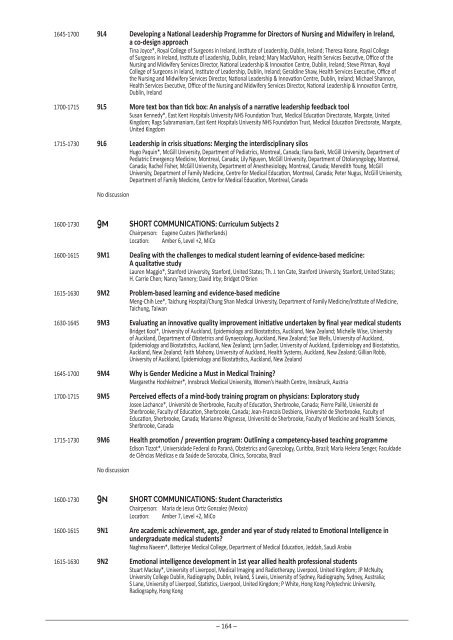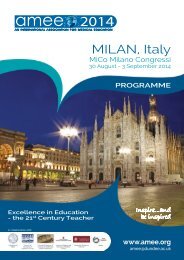2TUESDAY 2 SEPTEMBER 20141630-1645 9J3 A Matter of Attitude – analysis of reported changes in student attitude towards clinicalcommunication pre and post curriculum intervention. A novel report from a new curriculum inPharmacyJonathan Ward*, The University of Birmingham, Primary Care Clinical Sciences, Birmingham, United Kingdom; Anthony Cox,The University of Birmingham, Pharmacy, Pharmacology and Therapeutics Section, Birmingham, United Kingdom; ChristineHirsch, The University of Birmingham, Pharmacy, Pharmacology and Therapeutics Section, Birmingham, United Kingdom1645-1700 9J4 Challenges in the communication between doctor and patient with different ethnic backgrounds: Arealist reviewEmma Paternotte*, Sint Lucas Andreas Hospital, Amsterdam, Netherlands; Sandra van Dulmen, Sint Lucas Andreas Hospital,Amsterdam, Netherlands; Nadine van der Lee, Netherlands; Albert Scherpbier, Netherlands; Fedde Scheele, Netherlands1700-1730 Discussion1600-1730 9K SHORT COMMUNICATIONS: EmpathyChairperson: Peter Mc Coll (Chile)Opening Discussant: Chris Skinner (Australia)Location:Amber 4, Level +2, MiCo1600-1615 9K1 How students learn empathy: The adventure and exploration in empathy-promoting activitiesGin-Hong Lee*, Fu-Jen Catholic University, Department of Clinical Psychology, New Taipei City, Taiwan; Ping-Keung Yip, Fu-JenCatholic University, College of Medicine, New Taipei City, Taiwan; Ming-Teh Lin, Fu-Jen Catholic University, Department ofClinical Psychology, New Taipei City, Taiwan1615-1630 9K2 A multi-institutional study on empathy and personalityPatrício Costa, University of Minho, School of Health Sciences, Braga, Portugal; Raquel Alves, University of Minho, School ofEconomics and Management, Braga, Portugal; Isabel Neto, University of Beira Interior, Faculty of Health Sciences, Covilhã,Portugal; Pedro Marvão, University of Algarve, Department of Biomedical Sciences and Medicine, Faro, Portugal; MiguelPortela, University of Minho, School of Economics and Management, Braga, Portugal; Manuel João Costa*, University ofMinho, School of Health Sciences, Braga, Portugal1630-1645 9K3 Self assessed empathy and stress in medical students. A pilot study at University of Witten /HerdeckeGudrun Roling*, Private University of Witten / Herdecke, Faculty of Health, Institute for Integrative Medicine, IntegratedCurriculum for Anthroposophic Medicine (ICURAM), Witten, Germany; Myriam Valk Draad, Private University of Witten /Herdecke, Faculty of Health, Institute for Integrative Medicine, Integrated Curriculum for Anthroposophic Medicine (ICURAM),Witten, Germany; Gabriele Lutz, Private University of Witten / Herdecke, Faculty of Health, Institute for Integrative Medicine,Integrated Curriculum for Anthroposophic Medicine (ICURAM), Witten, Germany; Diethard Tauschel, Private University ofWitten / Herdecke, Faculty of Health, Institute for Integrative Medicine, Integrated Curriculum for Anthroposophic Medicine(ICURAM), Witten, Germany; Friedrich Edelhäuser, Private University of Witten / Herdecke, Faculty of Health, Institute forIntegrative Medicine, Integrated Curriculum for Anthroposophic Medicine (ICURAM), Witten, Germany; Christian Scheffer,Private University of Witten / Herdecke, Faculty of Health, Institute for Integrative Medicine, Integrated Curriculum forAnthroposophic Medicine (ICURAM), Witten, Germany1645-1700 9K4 Don’t tell me, show me: Promoting empathy and facilitating consistent learning in psychiatryS Choi*, University of Southampton, Medical Education, Southampton, United Kingdom; N Martin, University ofSouthampton, Psychiatry, Southampton, United Kingdom; S Harwood, Southern Health NHS FT, Psychiatry, Southampton,United Kingdom; J Rowden, Southern Health NHS FT, Psychiatry, Southampton, United Kingdom; P Hopper, Southern HealthNHS FT, Psychiatry, Southampton, United Kingdom1700-1730 Discussion1600-1730 9L SHORT COMMUNICATIONS: LeadershipChairperson: Susan Lieff (Canada)Location: Amber 5, Level +2, MiCo1600-1615 9L1 Development and Delivery of a Physician Management & Leadership Program (PMLP) inNewfoundland and Labrador (NL), CanadaSharon Peters*, Memorial University, Faculty of Medicine, St. John’s, Canada; Victor Maddalena, Memorial University, Facultyof Medicine, St. John’s, Canada; Lisa Fleet, Memorial University, Faculty of Medicine, St. John’s, Canada; Fran Kirby, MemorialUniversity, Faculty of Medicine, St. John’s, Canada1615-1630 9L2 Do residents receive feedback on leadership competencies? A framework analysisMA van der Wal*, University Medical Center Groningen (UMCG), Center for Innovation and Research in Medical Education(CIOMO), Groningen, Netherlands; N Renting, University Medical Center Groningen (UMCG), Groningen, Netherlands; JCCBorleffs, University Medical Center Groningen (UMCG), Groningen, Netherlands; F Scheele, Sint Lucas Andreas Hospital,Amsterdam, Netherlands; J Cohen-Schotanus, University Medical Center Groningen (UMCG), Groningen, Netherlands1630-1645 9L3 Developing the role of leader in residents: Wonder & ImproveElizabeth van Rensen, UMC Utrecht, Quality and Patient Safety, Utrecht, Netherlands; Judith Voogt, UMC Utrecht, InternalMedicine and Dermatology, Utrecht, Netherlands; Olle ten Cate, UMC Utrecht, Center for Research and Developmentof Education, Utrecht, Netherlands; Mirko Noordegraaf, Utrecht School of Governance, Public Management, Utrecht,Netherlands; Margriet Schneider*, UMC Utrecht, Internal Medicine and Dermatology, Utrecht, Netherlands– 163 –
1645-1700 9L4 Developing a National Leadership Programme for Directors of Nursing and Midwifery in Ireland,a co-design approachTina Joyce*, Royal College of Surgeons in Ireland, Institute of Leadership, Dublin, Ireland; Theresa Keane, Royal Collegeof Surgeons in Ireland, Institute of Leadership, Dublin, Ireland; Mary MacMahon, Health Services Executive, Office of theNursing and Midwifery Services Director, National Leadership & Innovation Centre, Dublin, Ireland; Steve Pitman, RoyalCollege of Surgeons in Ieland, Institute of Leadership, Dublin, Ireland; Geraldine Shaw, Health Services Executive, Office ofthe Nursing and Midwifery Services Director, National Leadership & Innovation Centre, Dublin, Ireland; Michael Shannon,Health Services Executive, Office of the Nursing and Midwifery Services Director, National Leadership & Innovation Centre,Dublin, Ireland1700-1715 9L5 More text box than tick box: An analysis of a narrative leadership feedback toolSusan Kennedy*, East Kent Hospitals University NHS Foundation Trust, Medical Education Directorate, Margate, UnitedKingdom; Rags Subramaniam, East Kent Hospitals University NHS Foundation Trust, Medical Education Directorate, Margate,United Kingdom1715-1730 9L6 Leadership in crisis situations: Merging the interdisciplinary silosHugo Paquin*, McGill University, Department of Pediatrics, Montreal, Canada; Ilana Bank, McGill University, Department ofPediatric Emergency Medicine, Montreal, Canada; Lily Nguyen, McGill University, Department of Otolaryngology, Montreal,Canada; Rachel Fisher, McGill University, Department of Anesthesiology, Montreal, Canada; Meredith Young, McGillUniversity, Department of Family Medicine, Centre for Medical Education, Montreal, Canada; Peter Nugus, McGill University,Department of Family Medicine, Centre for Medical Education, Montreal, CanadaNo discussion1600-1730 9M SHORT COMMUNICATIONS: Curriculum Subjects 2Chairperson: Eugene Custers (Netherlands)Location: Amber 6, Level +2, MiCo1600-1615 9M1 Dealing with the challenges to medical student learning of evidence-based medicine:A qualitative studyLauren Maggio*, Stanford University, Stanford, United States; Th. J. ten Cate, Stanford University, Stanford, United States;H. Carrie Chen; Nancy Tannery; David Irby; Bridget O’Brien1615-1630 9M2 Problem-based learning and evidence-based medicineMeng-Chih Lee*, Taichung Hospital/Chung Shan Medical University, Department of Family Medicine/Institute of Medicine,Taichung, Taiwan1630-1645 9M3 Evaluating an innovative quality improvement initiative undertaken by final year medical studentsBridget Kool*, University of Auckland, Epidemiology and Biostatistics, Auckland, New Zealand; Michelle Wise, Universityof Auckland, Department of Obstetrics and Gynaecology, Auckland, New Zealand; Sue Wells, University of Auckland,Epidemiology and Biostatistics, Auckland, New Zealand; Lynn Sadler, University of Auckland, Epidemiology and Biostatistics,Auckland, New Zealand; Faith Mahony, University of Auckland, Health Systems, Auckland, New Zealand; Gillian Robb,University of Auckland, Epidemiology and Biostatistics, Auckland, New Zealand1645-1700 9M4 Why is Gender Medicine a Must in Medical Training?Margarethe Hochleitner*, Innsbruck Medical University, Women’s Health Centre, Innsbruck, Austria1700-1715 9M5 Perceived effects of a mind-body training program on physicians: Exploratory studyJosee Lachance*, Université de Sherbrooke, Faculty of Education, Sherbrooke, Canada; Pierre Paillé, Université deSherbrooke, Faculty of Education, Sherbrooke, Canada; Jean-Francois Desbiens, Université de Sherbrooke, Faculty ofEducation, Sherbrooke, Canada; Marianne Xhignesse, Université de Sherbrooke, Faculty of Medicine and Health Sciences,Sherbrooke, Canada1715-1730 9M6 Health promotion / prevention program: Outlining a competency-based teaching programmeEdison Tizzot*, Universidade Federal do Paraná, Obstetrics and Gynecology, Curitiba, Brazil; Maria Helena Senger, Faculdadede Ciências Médicas e da Saúde de Sorocaba, Clinics, Sorocaba, BrazilNo discussion1600-1730 9N SHORT COMMUNICATIONS: Student CharacteristicsChairperson: Maria de Jesus Ortiz Gonzalez (Mexico)Location: Amber 7, Level +2, MiCo1600-1615 9N1 Are academic achievement, age, gender and year of study related to Emotional Intelligence inundergraduate medical students?Naghma Naeem*, Batterjee Medical College, Department of Medical Education, Jeddah, Saudi Arabia1615-1630 9N2 Emotional intelligence development in 1st year allied health professional studentsStuart Mackay*, University of Liverpool, Medical Imaging and Radiotherapy, Liverpool, United Kingdom; JP McNulty,University College Dublin, Radiography, Dublin, Ireland, S Lewis, University of Sydney, Radiography, Sydney, Australia;S Lane, University of Liverpool, Statistics, Liverpool, United Kingdom; P White, Hong Kong Polytechnic University,Radiography, Hong Kong– 164 –



